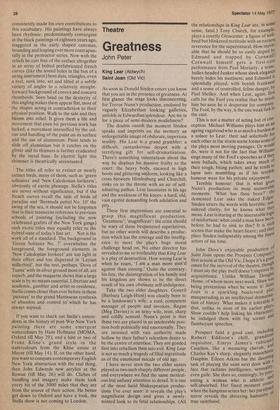Theatre
Greatness
John Peter
King Lear (Aldwych) Saint Joan (Old Vic)
As soon as Donald Sinden enters you know that you are in the presence of greatness. At first glance the stage looks disconcerting, for Trevor Nunn's production, enclosed by vaguely Elizabethan looking galleries, unfolds in Edwardian splendour. Are we in for a piece of semi-modern modishness?
The doubts vanish the moment Sinden speaks and imprints on the memory an unforgettable image of obdurate, imperious senility. His Lear is a grand grumbler: a difficult, cantankerous despot with a terrifying gift for self-dramatisation. There's something ostentatious about the way he displays his massive frailty to the court: the heavy body, encased in high boots and glittering uniform, looking like a cross between Hindenburg and Churchill, sinks on to the throne with an air of selfadmiring pathos. Lear luxuriates in his age and the weakness of his knees: a hard, old, vain egotist demanding both adulation and pity.
These first impressions are essential to grasp this magnificent production. 'Greatness'; 'magnificent': the critic should be wary of these bespattered superlatives, but no other words will describe a production which has the courage and the intelligence to meet the play's huge moral challenge head on. No other director has revealed to me so irrefutably that King Lear is a play of destruction. How wrong Lear is when he roars, 'I am a man more sinn'd against than sinning.' Quite the contrary: his fate, the disintegration of his family and his kingdom are shown to be the direct result of his own obstinate self-indulgence.
Take the two elder daughters. Goneril (Barbara Leigh-Hunt) was clearly born to be a landowner's wife: a cool, competent manager of people and invoices. Regan (Meg Davies) is an army wife, trim, sharp and coldly sensual. Nunn's point is that these two are placed in an intolerable position both politically and emotionally. They are invested with vast authority made hollow by their father's relentless desire to be the centre of attention. They are goaded first into rebellion then into evil. King Lear is not so much a tragedy of filial ingratitude as of the emotional suicide of old age.
I have never seen' the two elder sisters played as two such sharply different people; and everywhere we find the same meticulous but unfussy attention to detail. It is one of the most lucid Shakespearian productions I've ever seen: it reveals the play's magnificent design and gives a newlyminted look to its fatal relationships. (All
the relationships in King Lear are, in some sense, fatal.) Tony Church, for example, plays a courtly Gloucester: a figure of wellbred but blinkered rectitude with an earnest reverence for the supernatural. How inevitable that he should be so easily duped by Edmund and trapped by Cornwall! Cornwall himself gets a first-rate performance from Paul Moriarty: a tense, bullet-headed Junker whose sleek elegance barely hides his nastihess; and Edmund is splendidly played, with boyish frankness and a sense of controlled, feline danger, bY Paul Shelley. And when Lear, again, first calls for the Fool you realise that he needs him because he is desperate for companY' The Fool, by the way, is the one weak link in the cast.
This is not a matter of acting but of conception. Michael Williams plays him as an ageing vagabond who is as much a burden aS a solace to Lear: their sad solicitude for, each other in the storm scene forms some the plays most moving passages. Or wont' do, were it not for the fact that Williarns sings many of the Fool's speeches as if the); were ballads, which takes away much 01 their tough, biting pathos; and he tends W lapse into mumbling as if his terrible humour were for his private enjoyment Terrible humour: that is what give! Nunn's production its most memorable moments. 'What has thou been?' tile demented Lear asks the naked Edgar' Sinden utters the words with horrible, eonsidered clarity, for he knows what theY mean. Lear is staring at the inscrutable logic of misfortune: what could a man have been! before he had to sink to this? It is such scenes that make the heart heave; and.theYt place Sinden indisputably among the fines actors of his time.
John Dove's enjoyable production Saint Joan opens the Prospect CompanY,45 first season at the Old Vic. I hope it's a go," omen for the survival of the theatre, thong" T must say the play itself doesn't improve bY acquaintance. Unlike William Douglas Home, of whom more next week, Shaw was, being pretentious when he wrote it: Sain' Joan is a sparkling boulevard PI° masquerading as an intellectual dramansaI.; tion of history. What makes it tolerable that, unlike in most of his earlier PIaYs: Shaw couldn't help linking his charactersA' he indulged them with big scenes ally flamboyant speeches.
Prospect field a good cast, includinge Robert Eddison's chill, grandic'sd inquisitor, Emrys James's rubicund Cauchon, like a menacing cherub, au.c Charles Kay's sharp, elegantly masochistl Dauphin. Eileen Atkins has the dauntl task of playing the saint next door with„, face that radiates intelligence, senstialitc even guile. She does so, cunningly, by Pre d enting a woman who is athletic aus self-absorbed. Her finest moment conic, when the hangman seizes her: her paralYsen terror reveals the shivering humanitY °f true sainthood.


































 Previous page
Previous page